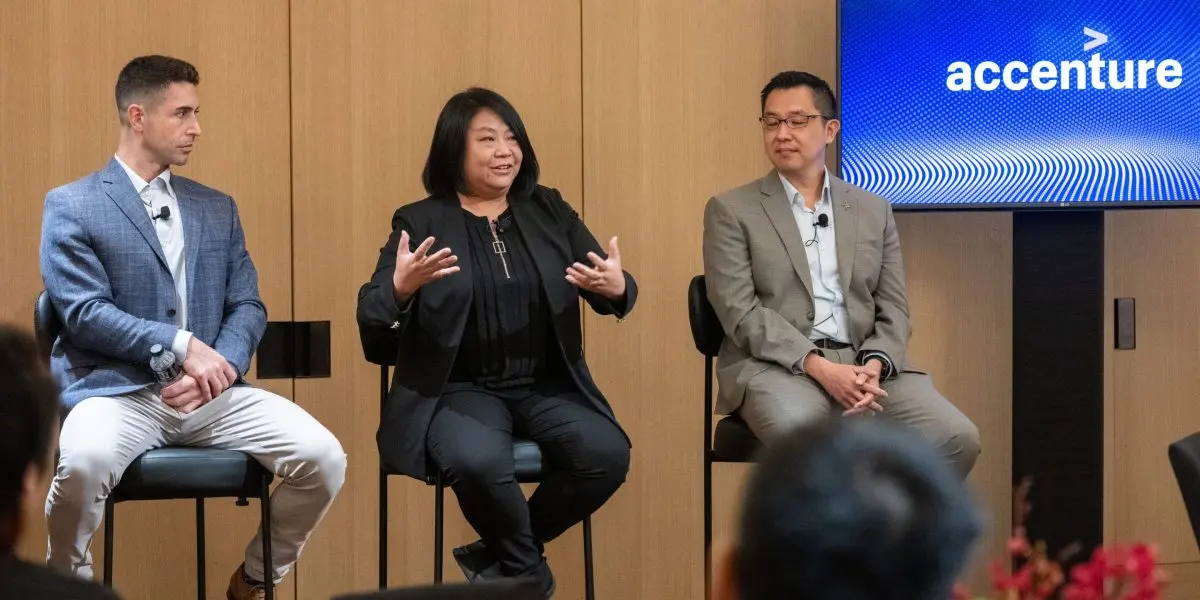AI Speeds Up Work But May Not Boost Productivity, Experts Warn
2 Sources
2 Sources
[1]
AI might make workers faster, but not necessarily more productive: 'They do it faster, then go for coffee breaks'
Many boardrooms, caught up in a post-ChatGPT frenzy, are trying to incorporate AI into their corporate workflows. Generative AI may be the first technological advance to allow for greater automation of service and knowledge work, whether it's at a call center or a management consultancy. But does letting workers generate emails or PowerPoint presentations faster really lead to greater productivity? Ramine Tinati, the lead at Accenture's APAC Center for Advanced AI, speaking at the Fortune Brainstorm AI Singapore conference last week, wasn't so sure. "If you give employees a tool to do things faster, they do it faster. But are they more productive? Probably not, because they do it faster and then go for coffee breaks," Tinati explained. Instead, "if you reinvent the work then suddenly those coffee breaks don't become meaningful anymore because you're doing something else," Tinati said, adding that some companies in Asia may be slower to adopt AI because "they don't think about reinventing the work." (Accenture is a founding partner of Brainstorm AI) Companies have, of course, been embracing forms of artificial intelligence to boost productivity for years, even before the release of ChatGPT in late 2022. May Yap, chief information officer at manufacturing solutions provider Jabil, said that her company had been using automation and AI to augment their so-called Golden Eye, the army of workers inspecting phones for scratches and blemishes. "Golden Eye" workers spend eight hours a day on inspections and working that long means that "errors will creep in," Yap said. AI helped to augment the inspection process to account for possible mistakes from human workers. Chee Wee Ang, the chief AI officer at Singapore's Home Team Science and Tech Agency, a government agency that develops tech capabilities for national security, said AI has helped improve processes significantly. "Some of the information extraction... we see like 200% [improvement]. So that's a significant improvement in terms of ROI," Ang said. Yet Ang also pointed out that beyond improving productivity, AI advancements are allowing Singapore's Home Team to do things that it couldn't do before like responding to new kinds of crime or emergency. Singapore's Home Team has 10 departments including the police force, emergency services, and immigration authorities. AI will inevitably lead to some job losses as certain roles become obsolete. But that can unnerve employees who are worried about getting automated out of a job. Employees already report concerns that they are being used to train their AI replacements. Panelists last week agreed that the way forward for affected employees would be reskilling and moving people into adjacent roles. "Transformation is scary, right? When you hear the word transformation, people don't like it," Yap, from Jabil, said last week. She made it clear that Jabil wanted to augment, not replace, its human workforce. She added that "general skills sets" and "good leadership traits" cannot be taken away by AI, regardless of how it might automate other tasks. Ang added that it was "very difficult to find in Singapore familiar with [generative AI]," meaning that his team has hired people with adjacent skill sets without direct experience. Another limitation? The lack of GPUs, as the Home Team has to work with on-site processors due to the sensitive nature of its work. And Tinati was optimistic that AI could liberate human employees to work on more productive things. "Their skills are now being uplifted to do other things, whether it's supervisory work or...learning other skills which allow them to support higher order tasks in the development cycle," he said.
[2]
AI Speeds Up Work -- But Just Leads To Coffee Breaks, Says Accenture Exec Who Urges Reinventing Roles, Not Just Tools - Accenture (NYSE:ACN), Amazon.com (NASDAQ:AMZN)
Artificial intelligence tools may accelerate task completion, but they don't automatically boost productivity unless companies fundamentally redesign how work gets done, according to Ramine Tinati, lead at Accenture PLC's ACN APAC Center for Advanced AI. What Happened: Speaking at Fortune's Brainstorm AI Singapore conference last week, Tinati challenged the post-ChatGPT corporate frenzy to integrate AI into workflows. "If you give employees a tool to do things faster, they do it faster. But are they more productive? Probably not, because they do it faster and then go for coffee breaks," Tinati explained. The comments highlight a critical disconnect between AI adoption and measurable business outcomes as companies pour billions into generative AI infrastructure. Amazon.com Inc. AMZN has committed over $100 billion to AI investments, while Microsoft Corp. MSFT allocated $80 billion for AI data centers despite cutting 9,000 jobs this year. Tinati emphasized that genuine productivity gains require "reinventing the work" rather than simply accelerating existing processes. He noted some Asian companies lag in AI adoption because "they don't think about reinventing the work." Singapore's Home Team Science and Tech Agency reported a 200% improvement in information extraction processes, according to Chief AI Officer Chee Wee Ang, according to the Fortune report. The government agency, which handles national security tech development, uses AI for tasks previously impossible, including responding to new crime types. See Also: Alibaba Cloud Pioneer Says He Doesn't Like AGI, ASI Classifications: 'It Just Means You Get More Capability. That's It' Why It Matters: The productivity debate intensifies as unemployment among recent college graduates climbed from 4% to 6.3%, according to ARK Invest CEO Cathie Wood, who cited AI's disruptive impact on entry-level positions. Palantir Technologies Inc. PLTR CTO Shyam Sankar countered that AI creates "superpowers" for workers, making them "50 times more productive" rather than merely 50% more efficient. Amazon CEO Andy Jassy recently warned that AI will shrink corporate workforces, with former VP Ethan Evans stating the company "won't keep everyone" despite new AI projects generating over 1,000 services in development. The challenge extends beyond individual companies. Economist Craig Shapiro predicts AI could disrupt 25% of all jobs by 2030, a structural shift that traditional Federal Reserve interest rate tools cannot address. Read Next: Mark Cuban Says It's Not The Students At Fault But The School If Answers Can Be Generated With AI: Kids Take 'Path Of Least Resistance' Disclaimer: This content was partially produced with the help of AI tools and was reviewed and published by Benzinga editors. Photo courtesy: Shutterstock ACNAccenture PLC$284.180.36%Stock Score Locked: Edge Members Only Benzinga Rankings give you vital metrics on any stock - anytime. Unlock RankingsEdge RankingsMomentum19.60Growth25.72Quality21.12Value16.54Price TrendShortMediumLongOverviewAMZNAmazon.com Inc$232.760.57%JBLJabil Inc$222.55-%MSFTMicrosoft Corp$515.050.26%PLTRPalantir Technologies Inc$161.101.45%Market News and Data brought to you by Benzinga APIs
Share
Share
Copy Link
Accenture executive and other industry leaders discuss the impact of AI on workplace productivity, emphasizing the need for work reinvention rather than just tool adoption.
AI's Impact on Workplace Productivity
In the wake of ChatGPT's release, many companies are rushing to integrate AI into their workflows. However, experts warn that simply adopting AI tools may not lead to the productivity gains executives hope for. Ramine Tinati, lead at Accenture's APAC Center for Advanced AI, highlighted this concern at the Fortune Brainstorm AI Singapore conference, stating, "If you give employees a tool to do things faster, they do it faster. But are they more productive? Probably not, because they do it faster and then go for coffee breaks"
1
.
Source: Fortune
The Need for Work Reinvention
Tinati emphasizes that genuine productivity improvements require a fundamental redesign of work processes. "If you reinvent the work then suddenly those coffee breaks don't become meaningful anymore because you're doing something else," he explained
1
. This perspective challenges the current corporate frenzy to integrate AI into existing workflows without considering broader organizational changes.AI Adoption in Various Sectors
Despite concerns, some industries are reporting significant benefits from AI integration:
-
Manufacturing: May Yap, CIO at Jabil, described how AI augments their "Golden Eye" inspection process, helping to reduce errors in quality control
1
. -
Government: Chee Wee Ang from Singapore's Home Team Science and Tech Agency reported a 200% improvement in information extraction processes thanks to AI
1
2
. -
National Security: AI advancements are enabling new capabilities in crime response and emergency management
1
.
Challenges and Concerns
The rapid adoption of AI is not without its challenges:
-
Job Displacement: There are growing concerns about AI leading to job losses, with unemployment among recent college graduates rising from 4% to 6.3%
2
. -
Skill Gaps: Finding professionals familiar with generative AI is challenging, leading to the hiring of individuals with adjacent skill sets
1
. -
Hardware Limitations: The scarcity of GPUs is a constraint for organizations working with sensitive data that requires on-site processing
1
.
Related Stories
Contrasting Views on AI's Impact
While some experts warn of potential job losses, others see AI as a tool for empowerment:
-
Palantir Technologies CTO Shyam Sankar believes AI creates "superpowers" for workers, making them "50 times more productive"
2
. -
Amazon CEO Andy Jassy acknowledges that AI will likely shrink corporate workforces
2
. -
Economist Craig Shapiro predicts AI could disrupt 25% of all jobs by 2030
2
.
The Path Forward
To navigate the AI revolution successfully, experts suggest:
-
Reskilling: Moving affected employees into adjacent roles and focusing on developing "general skill sets" and "good leadership traits" that AI cannot easily replicate
1
. -
Work Transformation: Companies need to rethink entire processes rather than simply accelerating existing ones
1
2
. -
Embracing New Possibilities: AI can free up human employees to focus on higher-order tasks and supervisory roles
1
.
As the debate on AI's impact on productivity continues, it's clear that the technology's potential extends beyond mere task acceleration. The challenge for businesses lies in reimagining work processes to fully leverage AI's capabilities while addressing the concerns of their workforce.
References
Summarized by
Navi
Related Stories
Recent Highlights
1
ByteDance's Seedance 2.0 AI video generator triggers copyright infringement battle with Hollywood
Policy and Regulation

2
Demis Hassabis predicts AGI in 5-8 years, sees new golden era transforming medicine and science
Technology

3
Nvidia and Meta forge massive chip deal as computing power demands reshape AI infrastructure
Technology








